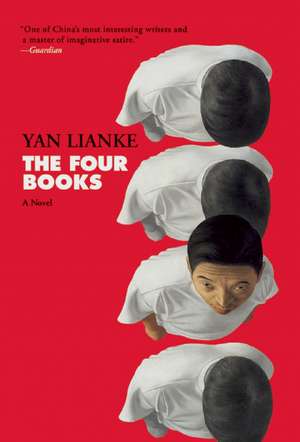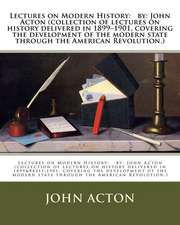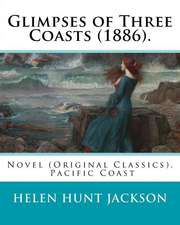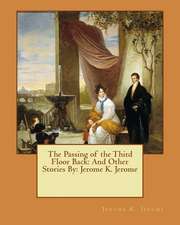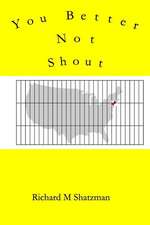The Four Books
Autor Yan Liankeen Limba Engleză Paperback – 7 mar 2016
In the ninety-ninth district of a sprawling reeducation compound, freethinking artists and academics are detained to strengthen and affirm their loyalty to Communist ideologies. Here, in this isolated part of Henan province, the Musician and her lover, the Scholar—along with the Author and the Theologian—are forced to carry out grueling physical work and are encouraged to inform on each other for dissident behavior. The prize: winning political favor and the chance at freedom. They're overseen by preadolescent supervisor, the Child, who delights in draconian rules, reward systems, and excessive punishments, such as confiscating treasured books. But when the higher-ups raise the agricultural and industrial production quotas to an unattainable level, the ninety-ninth district dissolves into lawlessness and the intellectuals are soon abandoned by the regime to survive on their own. With his incisive, lyrical prose, Yan Lianke melds political satire and allegory in this riveting, formidable tale that portrays the absurd and grotesque oppression of the Great Leap Forward.
| Toate formatele și edițiile | Preț | Express |
|---|---|---|
| Paperback (2) | 53.94 lei 24-30 zile | +20.40 lei 4-10 zile |
| Vintage Publishing – 3 mar 2016 | 53.94 lei 24-30 zile | +20.40 lei 4-10 zile |
| Grove Atlantic – 7 mar 2016 | 92.40 lei 3-5 săpt. |
Preț: 92.40 lei
Nou
Puncte Express: 139
Preț estimativ în valută:
17.69€ • 19.22$ • 14.87£
17.69€ • 19.22$ • 14.87£
Carte disponibilă
Livrare economică 31 martie-14 aprilie
Preluare comenzi: 021 569.72.76
Specificații
ISBN-13: 9780802124692
ISBN-10: 0802124690
Pagini: 352
Dimensiuni: 140 x 208 x 28 mm
Greutate: 0.36 kg
Ediția:First Trade Paper Edition
Editura: Grove Atlantic
ISBN-10: 0802124690
Pagini: 352
Dimensiuni: 140 x 208 x 28 mm
Greutate: 0.36 kg
Ediția:First Trade Paper Edition
Editura: Grove Atlantic
Recenzii
PRAISE FOR THE FOUR BOOKS
"An original work of art . . . The Four Books shows Yan in top satirical form." —Malcolm Forbes, The National
"[The Four Books] can be read as a culmination of the longer project in which Lianke is engaged: criticizing the foundations of the Chinese state and the historical narrative on which it is built, while still somehow remaining one of its most lauded writers." —Jacob Mikanowski, New Republic
"Arch and playful. . . . [Yan] deploys offbeat humour, anarchic set pieces and surreal imagery to shed new light on dark episodes from modern Chinese history. . . . [A] brave, brilliant novel." —David Evans, Financial Times
"[The Four Books] is driven by a cold fury at the events it recounts, its satire edged with Swiftian moral disgust. It is unsparing in its picture of the ways in which totalitarian habits of thought seep deep into personal relations, and it is smart in its depiction of how intellectuals get co-opted by the system . . . [Yan’s] fiction of ideas feels hard won and genuine, an expression of sorrow, bafflement, anger, and love." —Robert Anthony Siegel, The Rumpus
"No other writer in today's China has so consistently explored, dissected and mocked the past six and a half decades of Chinese communist rule. . . . An extraordinary novel, one that both commemorates the state’s victims and defies China's state-sponsored amnesia." —Isabel Hilton, Guardian
"[The Four Books is] a Chinese novel hailed across the planet as a masterpiece, and I’m normally the first to resist such an imposition before I've even opened the thing—but for once, the hype doesn’t go far enough. . . . Stupendous and unforgettable . . . a devastating, brilliant slice of living history." —Kate Saunders, The Times (UK)
"A satirical tale about abuse of power and the vicious survivalist psychology of people who have been robbed of their moral and intellectual compass . . . brilliantly chilling . . . The Four Books captures an aspect of Chinese life which is hard to imagine and understand for a foreigner, and Yan’s skilful depiction reaffirms why he is China’s most heralded and censored modern writer." —The South China Morning Post
"The Four Books should be celebrated for its originality. . . . A fascinating approach to a daring and interesting subject." —The Harvard Crimson
"One of contemporary Chinese literature's richest, wittiest, most seductive and powerful novels. . . . A joy to read." —The Saturday Paper (Au)
"A searing, allegorical view of Chinese society during some of the darkest moments of the Mao era. . . . Yan cements his reputation as one of China's most important—and certainly most fearless—living writers." —Kirkus Reviews
"Yan has built his substantial career on exposing the surreal absurdity of China’s 20th-century tragedies. . . . [This] multilayered novel is . . . a vital historical testimony." —Library Journal (starred review)
"A stinging indictment of the illogic of bureaucracy and tyranny . . . the literary structure is tight and the prose incredibly accessible. Readers will have difficulty putting this down." —Publishers Weekly
"One of the masters of modern Chinese literature, Yan Lianke gives all the pleasures one gets from reading. He can extract humor from the bleakest situation. I wholeheartedly recommend this latest book." —Jung Chang
"[A] rich and complex novel." —Booklist
"An original work of art . . . The Four Books shows Yan in top satirical form." —Malcolm Forbes, The National
"[The Four Books] can be read as a culmination of the longer project in which Lianke is engaged: criticizing the foundations of the Chinese state and the historical narrative on which it is built, while still somehow remaining one of its most lauded writers." —Jacob Mikanowski, New Republic
"Arch and playful. . . . [Yan] deploys offbeat humour, anarchic set pieces and surreal imagery to shed new light on dark episodes from modern Chinese history. . . . [A] brave, brilliant novel." —David Evans, Financial Times
"[The Four Books] is driven by a cold fury at the events it recounts, its satire edged with Swiftian moral disgust. It is unsparing in its picture of the ways in which totalitarian habits of thought seep deep into personal relations, and it is smart in its depiction of how intellectuals get co-opted by the system . . . [Yan’s] fiction of ideas feels hard won and genuine, an expression of sorrow, bafflement, anger, and love." —Robert Anthony Siegel, The Rumpus
"No other writer in today's China has so consistently explored, dissected and mocked the past six and a half decades of Chinese communist rule. . . . An extraordinary novel, one that both commemorates the state’s victims and defies China's state-sponsored amnesia." —Isabel Hilton, Guardian
"[The Four Books is] a Chinese novel hailed across the planet as a masterpiece, and I’m normally the first to resist such an imposition before I've even opened the thing—but for once, the hype doesn’t go far enough. . . . Stupendous and unforgettable . . . a devastating, brilliant slice of living history." —Kate Saunders, The Times (UK)
"A satirical tale about abuse of power and the vicious survivalist psychology of people who have been robbed of their moral and intellectual compass . . . brilliantly chilling . . . The Four Books captures an aspect of Chinese life which is hard to imagine and understand for a foreigner, and Yan’s skilful depiction reaffirms why he is China’s most heralded and censored modern writer." —The South China Morning Post
"The Four Books should be celebrated for its originality. . . . A fascinating approach to a daring and interesting subject." —The Harvard Crimson
"One of contemporary Chinese literature's richest, wittiest, most seductive and powerful novels. . . . A joy to read." —The Saturday Paper (Au)
"A searing, allegorical view of Chinese society during some of the darkest moments of the Mao era. . . . Yan cements his reputation as one of China's most important—and certainly most fearless—living writers." —Kirkus Reviews
"Yan has built his substantial career on exposing the surreal absurdity of China’s 20th-century tragedies. . . . [This] multilayered novel is . . . a vital historical testimony." —Library Journal (starred review)
"A stinging indictment of the illogic of bureaucracy and tyranny . . . the literary structure is tight and the prose incredibly accessible. Readers will have difficulty putting this down." —Publishers Weekly
"One of the masters of modern Chinese literature, Yan Lianke gives all the pleasures one gets from reading. He can extract humor from the bleakest situation. I wholeheartedly recommend this latest book." —Jung Chang
"[A] rich and complex novel." —Booklist
Notă biografică
Yan Lianke is the author of numerous short story collections and novels, including Serve the People!, Lenin's Kisses, and Dream of Ding Village, which was shortlisted for the Man Asian Literary Prize and the Independent Foreign Fiction Prize and adapted into a film (Til Death Do Us Part). He is the winner of two of China's most prestigious literary awards, the Lu Xun prize and the Lao She award, and he was a finalist for the Man Booker International Prize.
Descriere
Descriere de la o altă ediție sau format:
In the ninety-ninth district of a sprawling labour camp, the Author, Musician, Scholar, Theologian and Technician - and hundreds just like them - are undergoing Re-education, to restore their revolutionary zeal and credentials. In charge of this process is the Child, who delights in draconian rules, monitoring behaviour and confiscating books.
In the ninety-ninth district of a sprawling labour camp, the Author, Musician, Scholar, Theologian and Technician - and hundreds just like them - are undergoing Re-education, to restore their revolutionary zeal and credentials. In charge of this process is the Child, who delights in draconian rules, monitoring behaviour and confiscating books.
